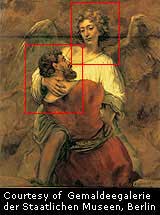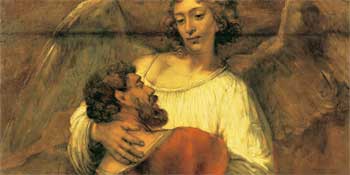Wrestling With Self
The Rabbis were aware that Jacob's ultimate struggle was with himself. In the Midrash, they embellish the story, positioning Jacob face to face with several mirror images.
And there wrestled a man with him. Rabbi Huna said: He appeared to him in the guise of a shepherd...The Rabbis said: He appeared to him in the guise of a brigand...Rabbi Shmuel bar Nachmani said: he appeared to him in the likeness of an idol worshiper...Rabbi Shmuel bar Acha said: he appeared to him in the likeness of a scholar. (Genesis Rabbah 37:2)
Consider the cast of characters Jacob midrashically encounters in his dream; a shepherd, a brigand, an idol worshiper, a scholar. They all appear to be manifestations of Jacob himself.
Jacob had been a shepherd both in his father's home and in the house of Laban. He had been accused of thievery and dishonesty in both settings. This midrashic encounter catapults him back in time, dredging up unresolved issues. His pangs of conscience are psychologically transformed into a wrestling match with the angel.
Ostensibly, the idolater and the scholar described in the midrash are polar opposites. A first reading might have us assume that we are speaking of Esau versus Jacob, but another reading is preferable. The idolater and the scholar represent extremes within Jacob, dimensions of Jacobs's character in collision.
Jacob is returning home and wonders what awaits him; what will ultimately be his destiny? Will he return to being the Jacob who he once was in his father's home, the peaceful scholar? Or after years of having left that, will he resort to idolatry? The destiny of his father's home is beleaguered with overwhelming challenges. Perhaps the life of the scholar demands too much of him. Maybe the time has come to cast off the burden of responsibility. The life of an idol worshiper is far less encumbered. Might it be that through these encounters he confronts incarnations of self that not only reflect his past but also serve to carve out his future?
Wrestling With God >>
